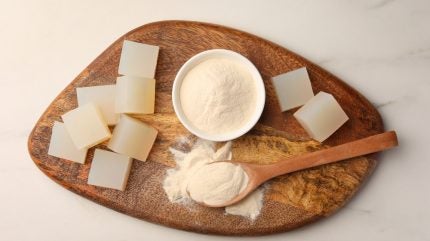
The $560 prototyping machine uses a syringe system to extrude liquid gelatine that is then stretched into long skinny form by rollers. The team’s “bio-fibres” are described as feeling similar to flax and can dissolve in hot water within minutes to an hour.
The team, led by Eldy Lázaro Vásquez, a doctoral student at the ATLAS Institute, presented the findings at the CHI Conference on Human Factors in Computing Systems in Honolulu.

Discover B2B Marketing That Performs
Combine business intelligence and editorial excellence to reach engaged professionals across 36 leading media platforms.
The researchers explained that every year meat producers throw away large volumes of gelatine that do not meet requirements for cosmetics or food products.
“When you don’t want these textiles anymore, you can dissolve them and recycle the gelatine to make more fibres,” said Michael Rivera, an ATLAS assistant professor behind the research presented at the CHI Conference.
The proof-of-concept gelatine textile sensors dissolved on demand, allowing embedded tech components to be recovered and releasing the yarns for easy recycling and reuse. The team said designers can introduce bio-based dyes, strengthening agents like fruit extracts, or other additives during the spinning process.
“You could customise fibres with the strength and elasticity you want, the colour you want,” said Lázaro Vásquez. “With this kind of prototyping machine, anyone can make fibres. You don’t need the big machines that are only in university chemistry departments.”

US Tariffs are shifting - will you react or anticipate?
Don’t let policy changes catch you off guard. Stay proactive with real-time data and expert analysis.
By GlobalDataThe dissolvable bio-fibres aim to tackle the growing textile waste problem, with over 11m tonnes added to US landfills in 2018 alone according to EPA data.
Beyond gelatine, the team is investigating fibres spun from other natural materials like crab shell chitin and algae-based agar-agar.
“We’re trying to think about the whole lifecycle of our textiles,” Lázaro Vásquez added. “That begins with where the material is coming from. Can we get it from something that normally goes to waste?”





